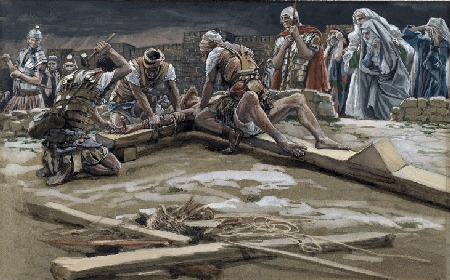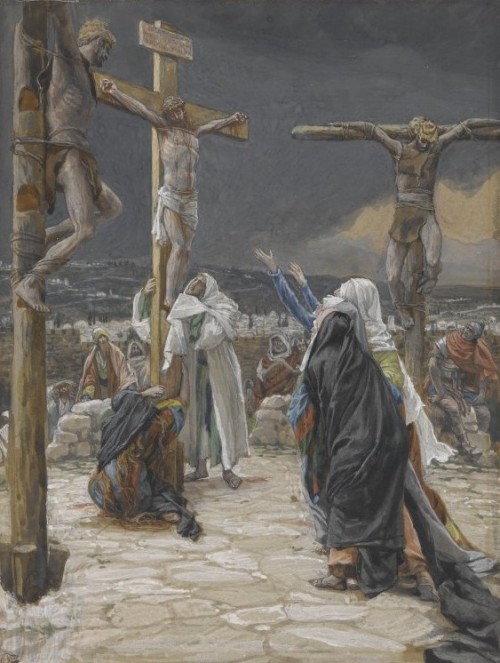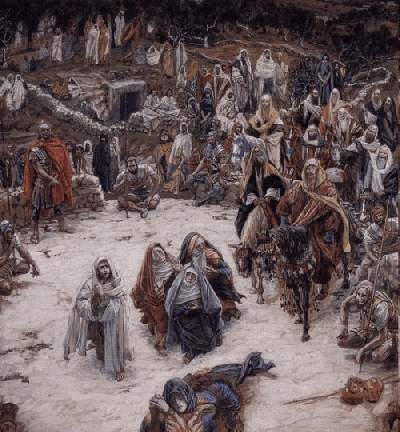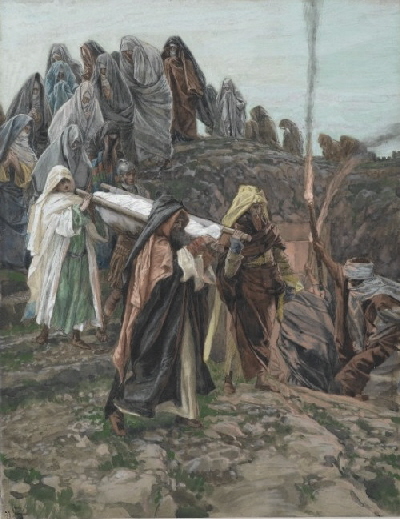|
<< Mark XV: At Golgotha >>
 A SAD procession moved from the palace of Pilate through the narrow streets of the city towards the northern gate. The Lord was clothed in His own garments, and carried the beams which were to form the cross; soldiers walked al the sides. At such times usually a written notice showed for what crime the prisoner was to die. Probably now they carried the board which Pilate wrote in Hebrew and Greek and Latin: THE KING OF THE JEWS. The priests objected, but Pilate would not change it, and it was fastened to the cross. With the Lord there walked thieves, each bearing his cross and guarded by soldiers. As they passed by, women wept at the sad sight, and the Lord said, "Daughters of Jerusalem, weep not for me, but weep for yourselves and for your children." Near the city gate they met a man named Simon, from an African city faraway, and they compelled him to bear the Lord's cross. A SAD procession moved from the palace of Pilate through the narrow streets of the city towards the northern gate. The Lord was clothed in His own garments, and carried the beams which were to form the cross; soldiers walked al the sides. At such times usually a written notice showed for what crime the prisoner was to die. Probably now they carried the board which Pilate wrote in Hebrew and Greek and Latin: THE KING OF THE JEWS. The priests objected, but Pilate would not change it, and it was fastened to the cross. With the Lord there walked thieves, each bearing his cross and guarded by soldiers. As they passed by, women wept at the sad sight, and the Lord said, "Daughters of Jerusalem, weep not for me, but weep for yourselves and for your children." Near the city gate they met a man named Simon, from an African city faraway, and they compelled him to bear the Lord's cross.
 Outside the city near to the busy road was a bare, round topped hill, perhaps with caves in the side, and called from its shape, Golgotha, the place of a skull. We may still see such a hill outside the northern gate of Jerusalem. Here they crucified the Lord and the two thieves, one on either side; and the Lord said, "Father forgive them, for they know not what they do." There were kind women in Jerusalem who used to bring to those in this great suffering, wine mingled with myrrh, which deadened the sense of pain. They brought it to the Lord, but when He had tasted it He would not drink. Outside the city near to the busy road was a bare, round topped hill, perhaps with caves in the side, and called from its shape, Golgotha, the place of a skull. We may still see such a hill outside the northern gate of Jerusalem. Here they crucified the Lord and the two thieves, one on either side; and the Lord said, "Father forgive them, for they know not what they do." There were kind women in Jerusalem who used to bring to those in this great suffering, wine mingled with myrrh, which deadened the sense of pain. They brought it to the Lord, but when He had tasted it He would not drink.
The hours passed from nine o'clock till noon. The soldiers sitting by divided His garments among them. The priests mocked as they passed by, saying, "Let him now come down from the cross, and we will believe." Among those who looked on were some who loved the Lord. Mary was there and the disciple John. The Lord saw them standing near andsaid to Mary, "Woman, behold thy son;" and He said to John, "Behold thy mother;" and John took Mary to his own home. From noon till about three o'clock there was darkness over all the earth. Then the Lord cried with a loud voice, "My God, my God! why hast thou forsaken me?" He was not looking for help to those around, but to the Divine power within Him, which had strengthened Him through all His life. Then He said, "I thirst." A sponge was dipped in vinegar and given Him to drink. "It is finished," He said. "Father, into thy hands I commit my spirit." With a great cry He bowed His head. The earth quaked. The veil in the temple was rent in twain from top to bottom.
 A great conflict had been taking place in the Lord's heart, between His great love for men and all the powers of evil. As we look upon the scene we are watching the greatest battle that ever took place on earth, and and the fate of all men on earth and in heaven depended upon its result. "It is finished." The victory is won, and what a wonderful peace is over all. A great conflict had been taking place in the Lord's heart, between His great love for men and all the powers of evil. As we look upon the scene we are watching the greatest battle that ever took place on earth, and and the fate of all men on earth and in heaven depended upon its result. "It is finished." The victory is won, and what a wonderful peace is over all.
It was now three hours past noon. At sunset the Sabbath would begin. There came a rich man, Joseph of Arimathea to Pilate, and asked leave to take down the body of the Lord. Joseph with Nicodemus, the same who once came to the Lord by night, took the body and tenderly wrapped it in linen cloths with spices. They did it hastily, for the sun was low, and they laid it in a new tomb cut in the rock in a garden beneath the hill. The door of the tomb was closed with a great wheel-shaped stone and the priests sealed the stone and set a watch. Faithful women who loved the Lord saw the place and hastened to prepare spices that after the Sabbath rest was past they might bring them to anoint the body of the Lord. They did not yet know what they would learn when they came again to the tomb on Easter morning.
We must read the story just as one of the Gospels gives it.
And when they had mocked him, they took off the purple from him, and put his own clothes on him, and led him out to crucify him.
And they compel one Simon a Cyrenian, who passed by, coming out of the country, the father of Alexander and Rufus, to bear his cross. And they bring him unto the place Golgotha, which is, being interpreted, The place of a skull. And they gave him to drink wine mingled with myrrh: but he received it not. And when they had crucified him, they parted his garments, casting lots upon them, what every man should take. And it was the third hour, and they crucified him. And the superscription of his accusation was written over, THE KING OF THE JEWS. And with him they crucify two thieves; the one on his right hand, and the other on his left. And the scripture was fulfilled, which saith, And he was numbered with the transgressors. And they that passed by railed on him, wagging their heads, and saying, Ah, thou that destroyest the temple, and buildest it in three days, Save thyself, and come down from the cross. Likewise also the chief priests mocking said among themselves with the scribes, He saved others; himself he cannot save. Let Christ the King of Israel descend now from the cross, that we may see and believe. And they that were crucified with him reviled him.
And when the sixth hour was come, there was darkness over the whole land until the ninth hour. And at the ninth hour Jesus cried with a loud voice, saying, Eloi, Eloi, lama sabachthani? which is, being interpreted, My God, my God, why hast thou forsaken me? And some of them that stood by, when they heard it, said, Behold, he calleth Elias. And one ran and filled a spunge full of vinegar, and put it on a reed, and gave him to drink, saying, Let alone; let us see whether Elias will come to take him down. And Jesus cried with a loud voice, and gave up the ghost. And the veil of the temple was rent in twain from the top to the bottom. And when the centurion, which stood over against him, saw that he so cried out, and gave up the ghost, he said, Truly this man was the Son of God. There were also women looking on afar off: among whom was Mary Magdalene, and Mary the mother of James the less and of Joses, and Salome; (Who also, when he was in Galilee, followed him, and ministered unto him;) and many other women which came up with him unto Jerusalem.
And now when the even was come, because it was the preparation, that is, the day before the sabbath, Joseph of Arimathaea, an honourable counsellor, which also waited for the kingdom of God, came,and went in boldly unto Pilate, and craved the body of Jesus. And Pilate marvelled if he were already dead: and calling unto him the centurion, he asked him whether he had been any while dead. And when he knew it of the centurion, he gave the body to Joseph. And he bought fine linen, and took him down, and wrapped him in the linen, and laid him in a sepulchre which was hewn out of a rock, and rolled a stone unto the door of the sepulchre. And Mary Magdalene and Mary the mother of Joses beheld where he was laid.---Mark XV.20-47.
Author: William L. Worcester 1904
(Third Painting: What Our Saviour Saw from the Cross by James Tissot)
Spiritual Correspondences
Wine mingled with myrrh, which the Lord did not drink >> Truth perverted by falsity
Vinegar or sour wine, which the Lord received >> Imperfect truth held honestly by simple minds
The soldiers rend his garments in their quarrels >> Destroying the letter of the Word but the inner meaning remains untouched
"My God, My God, why hast Thou forsaken Me?" The desolation and despair which came to the Lord in His times of temptation, as it does to us
Burial >> Resurrection and eternal life
Embalming >> The preservation and continuance of life in heaven
Burial of the Lord >> Glorification, becoming wholly Divine
Ointments and linen used in the Lord's burial >> The eternity of love and the eternity of truth, His love and truth had become Divine
Spiritual Meaning
 In the place of a skull where are only the bony externals of the Word, with no life in them they crucify Him ; for such was the Word with the church. In the evil thinking of the church He had no part. The letter of the Scriptures treating of Him they rent and shaped as they pleased. The spirit was protected from them by the Providence of God. His accusation, for which He was condemned, was that He would have saved men from the evil of their self-life, and taught them the life of charity Jesus, the King of Jews. In the place of a skull where are only the bony externals of the Word, with no life in them they crucify Him ; for such was the Word with the church. In the evil thinking of the church He had no part. The letter of the Scriptures treating of Him they rent and shaped as they pleased. The spirit was protected from them by the Providence of God. His accusation, for which He was condemned, was that He would have saved men from the evil of their self-life, and taught them the life of charity Jesus, the King of Jews.
With thieves 1 they crucified Him, because His resisting the appropriation of holy things to self would take the kingdom from them. They taunted Him with inability to save His own life, when in fact at that very time He was laying down the life of self which He abhorred, that He might take on the Divine life, pure and sweet and loving, in which He delighted. If He would have saved the self-life they would have accepted Him. The Divine in Him they despised and rejected. At the hour which should have stood for the brightest light, there was darkness over all the church until the night drew near.
The words of the twenty-second Psalm describe the sense of the Human mind that it was left alone ; which was indeed so that it might of itself use its Divine power to put off the self and unite with the Father's love. The rejoicing with which the Psalm closes, we may also ascribe to the Lord when this was attained.
The sympathy of men was limited to the letter of truth, and their imperfect understanding of its life. He accepts such sympathy; but even the letter teaches the laying down of the life; and this the Lord obeys.
It was not merely the love for physical life, and for self-vindication and honor from men that He laid down, but the claim to holiness and honor for the possession of the Divine Spirit, which the self-love afterward produced in the Christian Church, for its destruction ; and the further pride of understanding the deep things of the Word, which the same self-love must still produce. Absolutely all the desires of the self for advantage from holy things He gave up, turning from them and separating Himself from them in voluntary surrender to the Father's love. He gave them up for ever ; and all in Him that could admit such desires, He put off. (Author: John Worchester, 1898. Matthew's Gospel.)
1The thieves perhaps represent those who followed Him, and shared in His condemnation " the same as by the sheep and the goats; wherefore it was said to the one who acknowledged the Lord, that he should be with Him in Paradise." Apocalypse Explained, 600.
Pictures: James Tissot ----Courtesy of the Brooklyn Museum
|
|